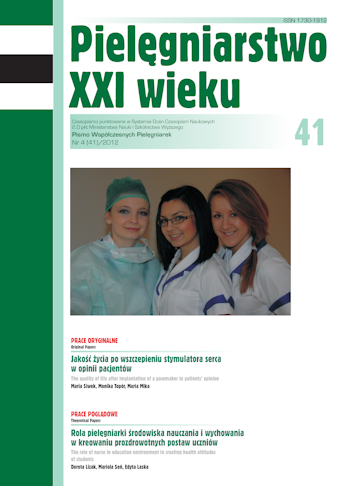The importance of health education in reducing complications among people with diabetes
Keywords:
diabetes, health education, health behaviorAbstract
THE IMPORTANCE OF HEALTH EDUCATION IN REDUCING COMPLICATIONS AMONG PEOPLE WITH DIABETES
Introduction. Diabetes is a chronic disease that requires sustained, intense treatment. Diagnosing it causes very large transformation in plans and life perspectives and fear. It is a social disease causing very serious consequences in the form of many complications.
Aim. The purpose of the carried out studies was to find an answer the question regarding the impact of broader health education on reducing complications among people with diabetes.
Material and methods. In order to obtain an answer for burning questions, my own questionnaire and Endler and Parker’s CHIP questionnaire for health behavioral studies have been used in the survey.
For quantitative character of results, the differences between researched samples (diabetes type 1 and type 2) regarding health behaviors in the impact of health education on reducing complications among diabetics, were analyzed with a student-t test . The test variant had been selected basing on F-Fisher test value.
Considering the qualitative character of results, the estimation of situation connected with the disease of researched people was evaluated with Fp – frequency evaluation test by A. Górecki.
Results. The results of research show that the dominant behavior among people with both type 1 and type 2 diabetes was the task-oriented health behavior (the average score was respectively 32.16 and 29.84); the second presented behavior was the health behavior oriented for negative emotions (the average score for people with type 1 diabetes is 31.04; for people with type 2 diabetes – 28.32). More than half of the respondents with the type 1 diabetes (60%) assessed the situation of disease as harm, while among people with type 2 diabetes, the dominant evaluation of the situation was a threat (80%). The differences between individuals with type 1 and type 2 diabetes are significant. The main motivation to improve knowledge about diabetes in both groups was the desire to be healthy (type 1 – 68%, type 2-64%).
Conclusions. Analysis of the results of study showed that broadly understood health education contributes to higher motivation for developing knowledge about diabetes, which implies the reduction of complications.
References
1. Bernas M, Tatoń J. Psychologiczne i społeczne aspekty pedagogiki zdrowotnej osób z cukrzycą. Medycyna Metaboliczna. 2002: VI, 3, 36 – 41.
2. Bishop GD. Psychologia zdrowia. Wrocław: ASTRUM; 2000.
3. Lustman PJ, Clouse RE. Identyfikacja nowych metod zapobiegania i leczenia cukrzycy: przykład depresji. Diabetologia po Dyplomie. 2004;1(4): 9 – 11.
4. Krentz AJ. Cukrzyca. Medycyna Praktyczna. Kraków: 2001.
5. Cooper PJ. Zaburzenia odżywiania. [w:] Lazarus AA, Colman AM, red. Psychopatologia. Poznań: Zysk i S – ka; 2001, s. 77 – 87.
6. Penson DF, Welssells H. Zaburzenia wzwodu prącia u chorych na cukrzycę. Diabetologia po Dyplomie. 2005;2(1): 23 – 31.
7. Medycyna po Dyplomie. Wydanie Specjalne Diabetologia. 2008; Marzec/Supl. 04/08:5 – 55.
8. Belfiare E, Magensen CE, red. Nowe poglądy na cukrzycę i jej leczenie. Kraków: KARGER; 2000.
9. Suhl E, Bonsignore P. Nauka samokontroli w cukrzycy dla osób w podeszłym wieku: podstawowe zasady i podejście praktyczne. Diabetologia po Dyplomie. 2007;4(1): 26 – 34.
10. Tatoń J, Czech A. Podręcznik edukacji terapeutycznej w cukrzycy – nauczanie samoopieki. Warszawa: PWN; 2000.
11. Czech A. Edukacja terapeutyczna – nowe cele, definicje i oczekiwania w ulepszaniu wyników prewencji i leczenia przewlekle chorych – przykład diabetologii. Medycyna Metaboliczna. 2005; 9 (2): 14 – 22.
12. Czech A, Tatoń J, Bernas M. Kompendium diabetologii. Gdańsk: Via Medica; 1999.
13. Weinger K. Nadążyć za starością: implikacje edukacji terapeutycznej w cukrzycy. Diabetologia po Dyplomie. 2007; 4(1): 9.
Downloads
Published
Issue
Section
License
Copyright (c) 2012 Teresa Marzena Tomaszewska, Małgorzata Wojciechowska (Autor)

This work is licensed under a Creative Commons Attribution 4.0 International License.




